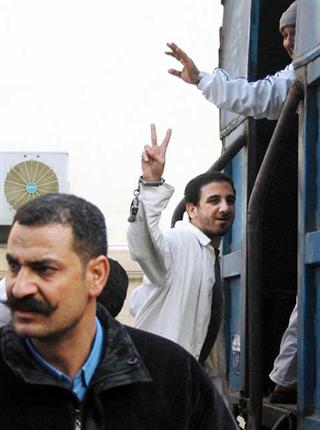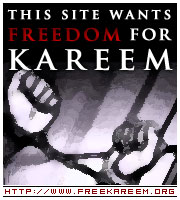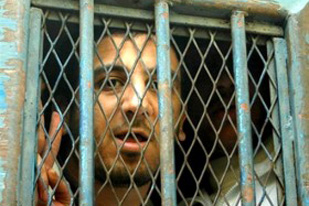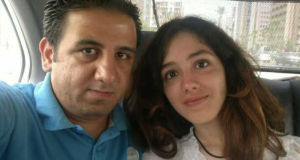Die Unterstützerdes verhafteten ägyptischen Bloggers haben den letzten Text von Karim Amer dankenswerter Weise ins Englische übersetzt. 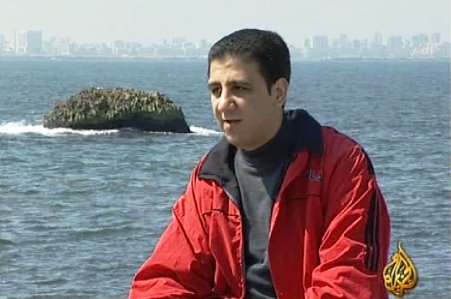
Hier ist er:
Your Blessings, O Azhar!
By Abdul Kareem Nabeel Suleiman (Kareem Amer)
Saturday, October 28, 2006
The human being might be forced to be connected to something, and he would find himself incapable of getting rid of it in spite of his rejection and hatred of it. However, a defining moment might come when he will be granted the opportunity to get rid of this heavy connection forever, without any results or side effects to follow.
It is rare for the separation from this thing to be accompanied with quasi-harsh or undesirable results. Nevertheless, it is a matter that may occur, and an example of that is what is happening with me and what I am facing these days.
I joined Al-Azhar to study in accordance with my parents’ desires. In spite of my complete rejection of Al-Azhar and religious thought (at a subsequent time), and despite my writings that strongly criticize religion’s infiltration into the public life, its control over human beings’ behavior and dealings with each other, and its directing them in conduct, getting rid of these fetters, which were in the form of my (formerly) being a student at Al-Azhar University, was not something easy or trivial as I had envisioned it would be.
When I obtained my freedom in the form of a final expulsion paper from the university last March, I had envisioned that these issues had ended at this point, and that obtaining this document was tantamount to my liberation from Al-Azhar University’s capture and its authoritarianism, first on its students’ lives, then on society members and on life in our country in varying degrees. I ignored what the Al-Gomhuria newspaper published regarding a copy of the investigation papers from my disciplinary board session – which I did not sign for reasons personal to me – being sent to the Public Prosecutor. I also ignored the university administration’s unpublicized refusal of handing me my file. I let life run as it is without engrossing myself in thinking of what might happen after that; this impression was in light of the fact that they had expelled me and hence that gave rest to all of us. I had thought that this was the end of my relationship with them, and I said: Let them keep my file with them. And indeed, I proceeded to apply for new original documents from these on my file, which I was in great need of.
However, it seems that the ‘blessings’ of Al-Azhar to its students cannot be easily erased. They keep pursuing students like a shadow. For instance, a student who obtained the Azharite Secondary Certificate cannot hand in paperwork requesting to study at any public university. I have repeatedly tried to do it this year, and in years before my expulsion, but all my endeavors yielded failure. The mere fact that you have obtained this notorious certificate disqualifies you from studying like other citizens in this country, who differ from you by carrying the General Secondary Certificate!
It also seems that the ‘blessings’ of Al-Azhar to its students are not limited to depriving them of completing their studies far away from it. What had happened, and what will happen to me in the coming days, seriously prove to me that these Azharite ‘blessings’ do not leave a student who tries to rebel against the university, and who attempts to reject what he is forced to study in it – from things that are inconsistent with logic, and that incite to violence against people who differ in creed – until he faces the edge of the grave (just as what was about to happen to me by impetuous students of the Sharia & Law Faculty, who were close to having me killed with their white weapons [knives] in jealousy for the religion of Allah – as one of the higher-level students justified to me at a later time – during last May in front of the faculty. Nevertheless, predestination, which I do not believe in, had written for me a new lease on life, and I managed to escape from their hands), or until he enters the gates of prison. And it seems that this is what I will be facing in the coming days, despite my dislike of rushing to predict future events and to foretell of what is unknown, but I always expect everything that is bad so the truth does not strike me at once.
Several hours ago, a summons reached my house, demanding my presence to appear for an investigation next Monday at the Moharram Bek Prosecutor Office. This is due to the investigations that the Prosecutor is initiating in the case that Al-Azhar raised with me by its intervention in what I write and publish outside its walls, on the free cyberspace that does not acknowledge any authority on what its users publish on it. It seems that the ‘blessings’ of Al-Azhar, which I vainly imagined that I had gotten rid of after I had obtained my liberation document from it, still follow me to this day. The summons by the Prosecutor to investigate me on this matter is one of the manifestations of these ‘blessings’, which do not leave their companion until he is in a situation similar to that of Dr. Nasr Hamid Abu Zayd, whose Al-Azhar blessings resulted in a court ruling that separated him from his wife; or in a similar situation to that of Dr. Ahmed Sobhi Mansour, whose Al-Azhar blessings resulted in him going to jail and then being forced to permanently emigrate from the country; or, at best, they leave him in a situation similar to that of Dr. Nawal Al-Saadawi, Ahmed Al-Shahawy, and others whom Al-Azhar has always recommended and recommends the confiscation of their writings, and the prevention of their distribution in the market.
I’m not afraid at all. My happiness that the enemies of free thought deal with me by employing such methods – which only the intellectually bankrupt excel at – make me more confident of myself, more steadfast in my principles, and on readiness to face anything for the sake of expressing my free opinion, without any restrictions imposed on me by governments, religious institutions, or even the totalitarian society, whose continuation serves these vile methods that the enemies of thought and the hobbyists of drugging, either by religion or by drugs, are no good at employing.
The mere existence of legal provisions that criminalize freedom of thought, and punish to prison whoever criticizes religion in any way, is considered to be a grave defect in the law. The law was supposed to be founded to regulate the relationships of the individuals in the society, not for suppressing their freedom for the benefit of religion, the law itself, or the social order. The human being – the individual – is the first, and his existence preceded everything. On that basis, criminalizing the human being for criticizing the social order, religion, or authority – which are things that came following the appearance of the first human being – is considered to be a grave defect in these laws. Such laws greatly transgress their powers to intervene in matters pertaining to the freedom of the personal individual, which is the sanctified area that no human being, regardless of who he is, has the right to transgress.
I hereby declare, in all frankness and clarity, my rejection and repudiation of any law, any legislation, and any regime that does not respect the individual’s rights and personal freedom, and does not acknowledge the absolute freedom of the individual in doing anything – as long as he does not affect anyone around him in a physical way –, and does not acknowledge the individuals’ absolute freedom in expressing their opinions, whatever they may be and whatever they cover, as long as this opinion is merely an opinion or words coming from a person, and is not coupled with any physical action that harms others. At the same time, I declare, in all clarity, that such laws do not obligate me in any way, and I do not acknowledge them or their existence. I detest, from the depths of my soul, whoever works on implementing them, whoever uses them as a guide, and whoever is satisfied with their existence or benefits from them. And if these laws are forced upon us, and we have no power or strength in changing them because that is in the hands of those in power with agendas, who are more than satisfied for the existence of such laws and are making use of it: Nevertheless, all of this will not push me into submission, or into waiting for relief and appeasement.
I hereby declare that I do not acknowledge the legitimacy of my summons to investigate a matter like this, which is within the realm of my freedom to express my opinions. This freedom was stipulated by the Universal Declaration of Human Rights, which Egypt has supposedly signed. Moreover, setting this declaration aside, and even if it did not exist, and even if Egypt did not sign it, human rights are very self-evident matters that do not require legislations or laws to regulate them or to define their essence.
To every gloating and spiteful person among those who envision that the likes of these primitive measures might change my positions, affect me, or force me to stray from walking in the path that I have set for myself, I say: Die in your rage and hide in your burrows. I shall not recant, not even by an inch, from any word I have written. These restrictions will not preclude my dream of obtaining my freedom, for that has been my wish ever since I was a child, and it will continue to run in my imagination in endlessness.
And to Al-Azhar University, its professors, and its Islamic scholars, who stood and are still standing against anyone who thinks in a free manner, far away from their metaphysical aspects and superstitions, I say: You will end up in the junkyard of history, and when that time comes, you will not find anyone to cry over you. Rest assured that your grasp will disappear as has happened with others like you. Happy is he who took advice from others!
